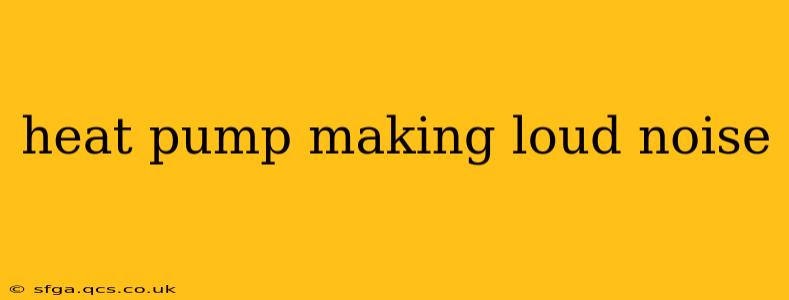A heat pump is a fantastic investment for energy-efficient heating and cooling, but when it starts making loud noises, it can be quite concerning. This comprehensive guide will help you diagnose the source of the noise and find solutions to restore the quiet operation of your heat pump. We'll cover various common causes and provide actionable steps to address them.
Why is My Heat Pump So Loud?
This is the most common question homeowners ask when their heat pump becomes noisy. Several factors can contribute to unusual sounds, ranging from minor issues easily fixed to more significant problems requiring professional attention. Let's delve into the most frequent culprits:
1. Unusual Sounds from the Outdoor Unit: What Could They Mean?
The outdoor unit of your heat pump is the most likely source of loud noises. These noises can range from squealing and grinding to buzzing and thumping. Let's break down some common sounds and their possible causes:
- Squealing or Screeching: This often indicates a problem with the fan motor bearings. Worn or damaged bearings can create friction, leading to a high-pitched squeal.
- Grinding or Rattling: This could be due to loose components within the unit, such as fan blades, or problems with the compressor. Debris caught in the fan blades can also cause rattling.
- Buzzing or Humming: This often points to an electrical issue, possibly a failing capacitor or motor windings.
- Clicking or Thumping: This may be caused by the expansion valve or compressor experiencing issues.
2. What Causes Loud Noises Inside the House (Indoor Unit)?
While the outdoor unit is the usual suspect, the indoor unit can also generate noise. Listen carefully to pinpoint the source and type of noise:
- Hissing: This might indicate a refrigerant leak, which is a serious issue requiring immediate professional attention.
- Clicking or Popping: This is often related to the electrical components within the system, such as relays or the contactor.
- Gurgling or Bubbling: This can suggest a problem with the refrigerant flow or a potential blockage in the system.
3. Is it Normal for a Heat Pump to Make Some Noise?
Yes, a certain level of noise is normal for a heat pump. However, a sudden increase in noise or the appearance of unusual sounds should be investigated. A gentle hum or whooshing sound from the fan is typical, but anything louder or more jarring is a cause for concern.
4. How Can I Troubleshoot My Noisy Heat Pump Myself?
Before calling a professional, try some basic troubleshooting steps:
- Inspect the Outdoor Unit: Check for any loose debris, such as leaves or twigs, that might be obstructing the fan blades. Carefully remove any obstructions.
- Check for Obstructions: Ensure nothing is blocking airflow around the outdoor unit. Proper airflow is crucial for efficient operation and noise reduction.
- Tighten Loose Bolts and Screws: Use a wrench or screwdriver to tighten any loose bolts or screws you find on the outdoor unit. This can often resolve rattling noises.
5. When Should I Call a Heat Pump Repair Technician?
If the noise persists after your initial troubleshooting, or if you notice any of the more serious issues mentioned above (like hissing or gurgling), it's crucial to contact a qualified HVAC technician. Attempting to fix more complex problems yourself could void your warranty and even cause further damage to your heat pump.
6. How Much Does it Cost to Repair a Noisy Heat Pump?
The cost of repair will vary depending on the source of the problem and the necessary parts. Minor repairs, such as tightening loose parts, might be inexpensive. However, more significant repairs, such as replacing the compressor or motor, can be considerably more costly.
7. How Can I Prevent My Heat Pump from Making Loud Noises?
Regular maintenance is key to preventing loud noises and ensuring the longevity of your heat pump. Schedule annual professional inspections and cleaning to identify and address potential issues before they become major problems. Keeping the area around the outdoor unit clear of debris is also essential.
By understanding the common causes of noise and following the troubleshooting steps outlined above, you can often resolve minor issues yourself. However, remember that when in doubt, it’s always best to seek professional help to prevent further damage and ensure the safe and efficient operation of your heat pump. A well-maintained heat pump will provide years of quiet and efficient service.
